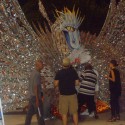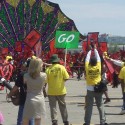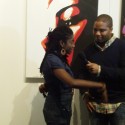Speak On It: Jay-Z, still a hustler?
Every time it appears Jay-Z adoration has reached its threshold, it grows more lop-sided and nears worship.
Last week he released Decoded, written in collaboration with celebrated hip-hop author and journalist Dream Hampton.
As can be expected of any product from Brand Jay-Z there’s been a huge marketing push to promote the book – an interactive and crafty contest with online search engine company Bing, interviews on the Daily Show and other later night spots, a CNN feature, an hour long Howard Stern interview, and even a plug on Oprah’s giveaway show to name just a few.
For long time fans of Artist jay-Z, there’s barely anything new in the book except a few rare anecdotes about his guarded life. Most of this material has been reported multiple times in his music and the press.
While it provides context and functions as a cultural translation of hip-hop for the rest of America, and by extension the world, it seems also to be an elaborate excuse for the negative aspects of the culture.
Fans have been decoding his words for a decade plus now. He’s an exceptionally gifted lyricist, savvy businessman and industry leader.
Still, there is something slightly minstrel about his parading around the media championing his past as a drug dealer. He still wears the crack dealer badge with honour, despite stating the contrary. Perhaps no one or nothing else in pop culture, save for the movie Scarface, has effectively mythologized drug dealing better than he has.
One of the biggest songs of the past year, his “Empire State of Mind”, contains stylized references to cooking and selling crack cocaine (“catch me in the kitchen like a Simmons whippin’ pastry”). So do virtually all of his songs and catch phrases unbeknownst to most listeners.
Decoded is an insightful look into the stories and characters that inspired his lyrics – part analysis, part memoir. It’s an intriguing work that serves to illustrate his personal past and the ’70s/’80s socio-economic conditions that birthed hip-hop culture.
However, he and the genre’s biggest stars continue to deny responsibility for its rampant misogyny, sexism and violence. While it’s warranted that hip-hop is informed by larger American culture and institutional racism, at some point the culture has to accept at least a fraction of responsibility for its negativity. With Decoded, Jay-Z comes very close but still fails to do that.
The drug epidemic of the 80’s, the environment that sprouted hip-hop culture, was a massacre. It claimed millions of victims that either perished or were indefinitely scarred. The devastation was exponential. One was either a user, related to users, or victim of the upsurge in crime due to drugs.
Hip-hop’s biggest ambassador, Jiggaman, was at one time a predator that fed on the desperation of these lost souls. He has said in many an interview that he’s not glamorizing that life. In fairness, he was in equal part a victim of systemic injustice simply by virtue of being born into those communities. Still, at 40 years of age and with the time that a net worth of close to half a billion affords, one might assume he’d be closer to completely renouncing that way of life. Perhaps if it were not for the fact that that image is his cash cow…
No other individual wields as much influence on hip-hop culture like Shawn Carter. He sets music, fashion and business trends. Industry tycoon Lyor Cohen once commented that while most rappers were stuck on stupid, Jay-Z was stuck on forward. Indeed, this premise was the centerpiece of one of Jigga’s latest singles in “On to the Next One.”
In 1996, He garnered attention with his debut Reasonable Doubt, which contained lush and intricate stories of underworld business, politics, alliances, enemies, wars and betrayals. His music was a mix between the understated and implied quality of Coppola with the theatre and production of Scorsese on record. Jay was equal parts Vito Corleone and Kool G Rap - effortlessly cool, self-possessed, and street. He had the timing and wit of a comedian, and made cultural references as yet unheard of in hip-hop music. He was only 26, and only recently retired from a criminal career.
In 2010, he pals around with Warren Buffet, Bill Gates, [New York City] Mayor Bloomberg, Barack Obama, and Oprah. Monumental achievement and progress, no doubt. But a real success, and something uncharted, would be for him to confess the illness and affliction in idolizing that hustler/dealer persona he helped popularize. For a while now all his slick and ingenious hyperboles, puns, alliteration, allusions and double entendres kept us entertained. Ultimately though, it’s a culture of death celebrating one’s triumph in achieving wealth by feeding on countless lost souls. What does it say about us as a generation when we collectively revere that? Let us repent and move on to the next.







Ovbiously the person writing this isn’t a real fan of Rap Music … maybe of Hip Hop . But Jay-z doesn’t need to do anything for anybody . He lived a life and came on record and let the world know . He did not tell people to do what he did , he tells them to do better like he’s doing now . A lot of people can relate to that . U don’t I guess cause u want him to change his lyrics ? His lyrics are not leading people to do anything , if anything it should be his action speaking . That’s the difference with Hip Hop and Rap , one lived a ruff life and another is living off the life of the rappers . Plus that’s ur opinion , ur supposed to state facts atleast . It’s more than music when it comes to Jayz . He’s always encourage people to do better , and if u can’t how the hell you are going to blame the person that was living a messed up life and made something out of it . You going to turn to that person and blame him . Sway magazine . Stick to writing about other people . FYI . People would click on this because it says Jayz not because of drugs or shit he did in the past . So if I clicked on this to read , it was to read about jayz not about how u think of him .
Leave your response!